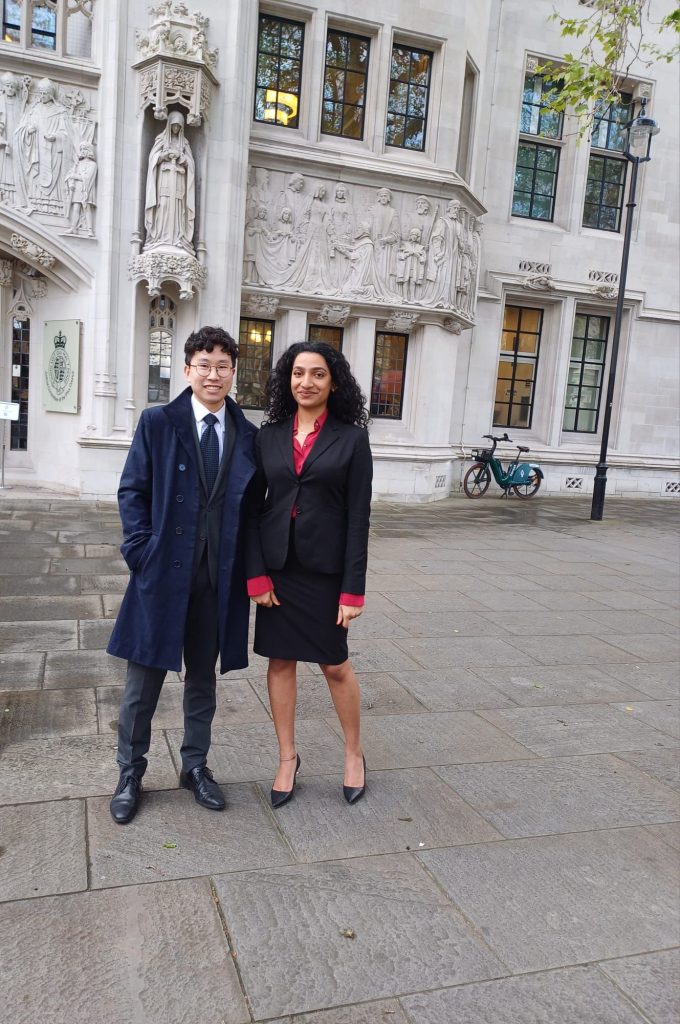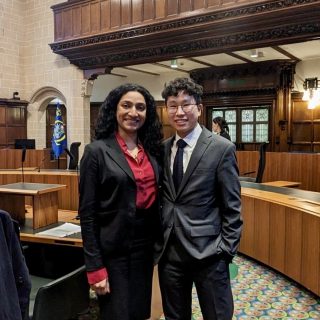In the haze of joining the GDL last year we were encouraged to apply to represent City in as many mooting competitions as possible. 5 Paper Buildings’ Michael Corkery QC Criminal Law Moot stood out to us, as both of us had an interest in criminal law, and it was a beginner-friendly moot that didn’t require previous legal knowledge. Neither of us had mooted before, so we felt this was the perfect chance to get our feet wet, and were very happy to be selected.
The moot was comprised of two knock-out rounds before the final. The first round was held in person at Middle Temple, which 5PB had generously made a whole-day event, with the moot only making up one part. The second round was conducted online, and the final was held in person in the UK Supreme Court. The problems were released exactly three weeks in advance, with the deadline for our bundles one week before each round.
Round 1

For the first round, the moot problem focused on a conviction for rape: the first ground dealt with the conclusive presumptions in s.76 Sexual Offences Act 2003, and the second ground concerned admissibility of a complainant’s previous sexual history as criminal evidence. We were chosen to represent the Appellant, ‘John Smith’, and quickly decided who would be Senior and Junior Counsel (both of us ended up sticking to these roles all through the competition).
Our first priority was to tackle legal research to understand what the problem was asking of us. We scoured Westlaw and Lexis+, and spoke to our Criminal Law lecturer to gain a better understanding of the area. As this was our first moot, in this round we also consulted some advocacy resources in the library (we found How To Moot by Gary Watt and John Snape particularly helpful!), and met with some of our tutors to learn how to improve our oral and written arguments. You can get Watt & Snape in the library or as an e-version.
We split the workload evenly in this stage, mainly focusing on our own grounds of appeal, but sending over anything we thought the other might find useful, and working on the skeleton argument in a shared document. We were also given specific instructions on how to structure our bundle: adding hyperlinks, bookmarks, and other formatting stipulations. Though it took time to complete these requirements, we ended up completing and submitting our bundle before the one-week deadline.
Once the bundle was finalised, we focused on practicing our oral submissions as a team. We completed a rudimentary run the weekend before submitting our bundle, then for the last week, practiced with each other at least once a day, taking turns delivering our submissions in full, and fielding interventions from the other. After each practice we would give each other feedback and make a note of the interventions we were asked in order to work on our responses to them.
One of the tactics we developed was the ‘rude judge run’, developed after both of us had dealt with very intense judges during the first round of the GDL moot, five days before the competition. In the rude run, we would disregard time and instead mercilessly zero in on every misspoken word or weak link in the other’s argument. This was incredibly nerve-wracking initially, but in hindsight it was one of the most helpful preparation tactics, and it stuck for the entirety of our prep as a team.
In the last five days, we roped in some of our friends on the GDL to practice both prepared and off-the-cuff interventions, so we could get to grips with submitting before judges with different intervention styles. Our friends took it very seriously and were extremely eager to help us. In addition, when our Respondent’s bundle was released to us three days before, we also studied it for more potential counterpoints, but we didn’t spend too much time on this as we wanted to prioritise our own submissions.
The day of the first round, we were assigned to moot first before continuing with the rest of the activities planned in the day. In the moot itself, we competed against a team from Durham University – which was a fun coincidence, as both of us are Durham grads! We were naturally nervous, but our judge was very kind and we felt sufficiently prepared for the interventions she asked. It was over in a flash – and we were able to relax during the bail application exercise and pupillage Q&A for the rest of the day.
At the end, the organisers announced that 12 teams had progressed to the next stage – and we were thrilled when we heard City’s name! We spent the next hour networking with the 5PB barristers and making new friends from around the country, and left feeling ready to tackle the next round together.
Round 2

The second-round problem turned on a joint enterprise murder conviction; we were once again chosen to represent the Appellant, ‘Marcus Owen’, arguing that the Jogee foresight rule had been incorrectly applied, and that exceptional leave to appeal out of time should be granted to our appellant.
The problem was released over Christmas break, so our preparation was slightly stunted by time differences and air travel, but we fell into our established rhythm from last round, completing research, our bundle, and submission practice in the same way. The only difference was, given that this round would be online, we didn’t practise in person. This was to get used to technical interruptions, eye contact and pacing suited to online mooting, which was more difficult to bear in mind than we’d thought!
During the second round itself, our judge challenged our points more than previously, and the internet disconnected during one of our submissions, but beyond that, they went as well as they could. Within six days, we received an email letting us know that of the 12 teams, we had been selected to progress to the Final, alongside the team from Lincoln’s Inn – which would be held in the Supreme Court! We were in shock, but were ecstatic that our solid teamwork and relentless drilling had paid off.
The Supreme Court final

The 5PB moot is unusual in that two of the four individuals will win the moot (rather than one team). Theoretically, the two winners could come from the same team, but the list of previous winners showed that this had never happened before. Nonetheless, our preparation for the final was much the same as for the previous rounds; our attitude of working together as a team to help each other certainly never changed.
The moot problem for the final was more technical in nature. It focused on the procedural issue on the availability of a court’s abuse of process jurisdiction where the defendant is a victim of trafficking following the Modern Slavery Act 2015. Once again, we were allocated to represent the Appellant (the Crown).
On the day itself, we first had a tour of the Supreme Court, including the private library that the judges use and the various courtrooms inside the building. We then found out that we would be advocating in the main courtroom, where the most significant cases in recent times have been argued. Our excitement (and nerves!) only increased further when we found out who would be judging the final: The Honourable Mrs Justice McGowan (a High Court Judge), HHJ Deacon KC (a Circuit Judge), and Julian Christopher KC (Head of 5PB Chambers).
Both our oral submissions went as well as we could have hoped for in the context of a final in the Supreme Court before real judges. We had achieved such a level of familiarity with the case that we had decided to deliver our oral submissions off by heart, with only our bundles in front of us for direct quotes. The risk paid off in the end, and we received very positive feedback overall. Mrs Justice McGowan, for example, said that she could imagine all of us holding our ground in a real appellate court, which meant a lot coming from a High Court Judge!
Akriti was particularly brilliant and very deservedly was the winner from our side (the other winner, James Forrester, also happened to be a City GDL student). Their prize was a mini-pupillage with 5PB and a ‘Human Rights in Criminal Law’ book written by Ben Douglas-Jones KC, a member of 5PB who had acted in virtually all of the biggest modern slavery cases in recent years.
Members of 5PB, family and friends had all come to watch the final, and 5PB had kindly organised food and drinks at a nearby pub for all of us afterwards. It was really nice to see how many 5PB barristers had come out for the final and have a chat with them in a more relaxed atmosphere.
Finally, we would like to express our deep gratitude to 5PB for organising the whole competition and Dr Frank Zhang for giving us the opportunity to represent City Law School in the first place!
For those who might be interested in participating in this moot: it was certainly a steep learning curve, but our experience shows that you do not need to have mooted before in order to do well. The demands on our time from it were very reasonable, especially given that it has benefitted us in so many ways, whether that be when revising for the GDL criminal law module or in a future career as criminal barristers. We would highly recommend putting yourself forward for it if it sounds interesting in any way to you!
Thanks to Douglas and Akriti for this insight into the 5PB Moot.
Akriti is an American international student, pursuing a career in international criminal law. After finishing the GDL in June, she’s now completing an LLM at SOAS, specialising in International Law, and will go on to do the Bar Course next year. She intends to stay in the UK as long as Visas and Immigration will allow her to.
Douglas previously studied Classics before completing the GDL at City Law School, where he is now studying the BVS. His legal studies have been supported by scholarships from Gray’s Inn and City Law School, and he hopes to practise as a criminal barrister one day.

